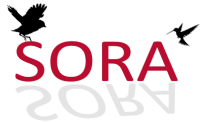Notes from Alameda, California
Notes From Alameda, Cal.
The Sharp-shinned Hawk (Accipiter velox) has been commoner at Alameda this winter than ever before. On Feb. 7 I took a ♂, the darkest I have yet noted. It had just eaten a California Towhee (Pipilo f. crissaIis) and allowed me to approach within forty feet as it sat on the ground where it had been for some time. The hawk was quite thin and one leg had knit over an old break.
In the matter of discoloration of plumage of certain birds as mentioned by Richard C. McGregor in the January CONDOR (p. 18) some of the birds mentioned by Mr. Slevin were possibly shot by me, but the discoloration I attribute to their contact with the foliage of the cypress and pine, especially the latter and perhaps the eucalyptus. The most notable cases of discoloration under my notice have been in the California Purple Finch (Carpodacus p. californicus) shot at different seasons among the pines, except perhaps the Arkansas Goldfinch (Spinus psaltria) that feeds on a sort of gummy weed of the thistle variety. The Sharp-shinned Hawk spends considerable time among the pines as does the Desert Sparrow Hawk (Falco s. deserticolus). Specimens of the latter that I have seen have been so soiled as to appear dark on the breast and much soiled-looking upon the wing and tail tips. The Red-shafted Flicker (Colaptes cafer) is more or less soiled in individual specimens. It frequents these trees a great deal but a great amount of discoloration is due to its fondness for buildings and unused flues. The House Finch (Carpodacus m. frontalis) is often considerably soiled where nesting in pine and cypress trees and often feeds among the tar weed thistles with the goldfinches. A few specimens of Western Flycatcher (Empidonax difficilis) and Russet-backed Thrush (Hylochicla ustulatus) taken breeding in pine and cypress groves showed no soiled plumages.
Replying to Mr. Joseph Mailliard’s remarks in the CONDOR (I. 54) as to which sex predominates in winter residents in different localities, I give my observations for Alameda and vicinity: Dwarf Hermit Thrush (Hylocichla aonalaschkæ) ♂ ; Ruby-crowned Kinglet (Regulus calendula) ♂ to a noticeable degree; Western Robin (Merula m. propinqua) ♀; Varied Thrush (Hesperocichla nævia) ♀; Oregon Junco (Junco hiemalis oregonus) all ♂s of over forty specimens taken during the past few years except ♀ March 11, 1899, ♀ March 24, 1900 and ♀ Alvarado, April 24, 1897; Anna's Hummingbird (Calypte anna) all ♂'s in midwinter. Mexican Horned Lark (Otocoris a. chrysolæma) the few specimens taken were ♂'s; House Finch (Carpodacus m. frontalis) mostly ♂'s, often seen in pairs; California Purple Finch ( Carpodacus p. californicus) mostly ♂'s, in plain garb; Cabanis's Woodpecker (Dryobates v. hyloscopus) a few noted, all ♂'s; California Clapper Rail (Rallus obsoletus) ♀'s by a large majority.
D. A. COHEN
Alameda Cal.

